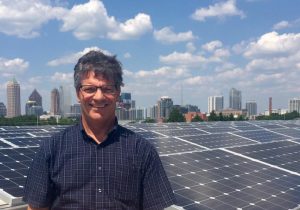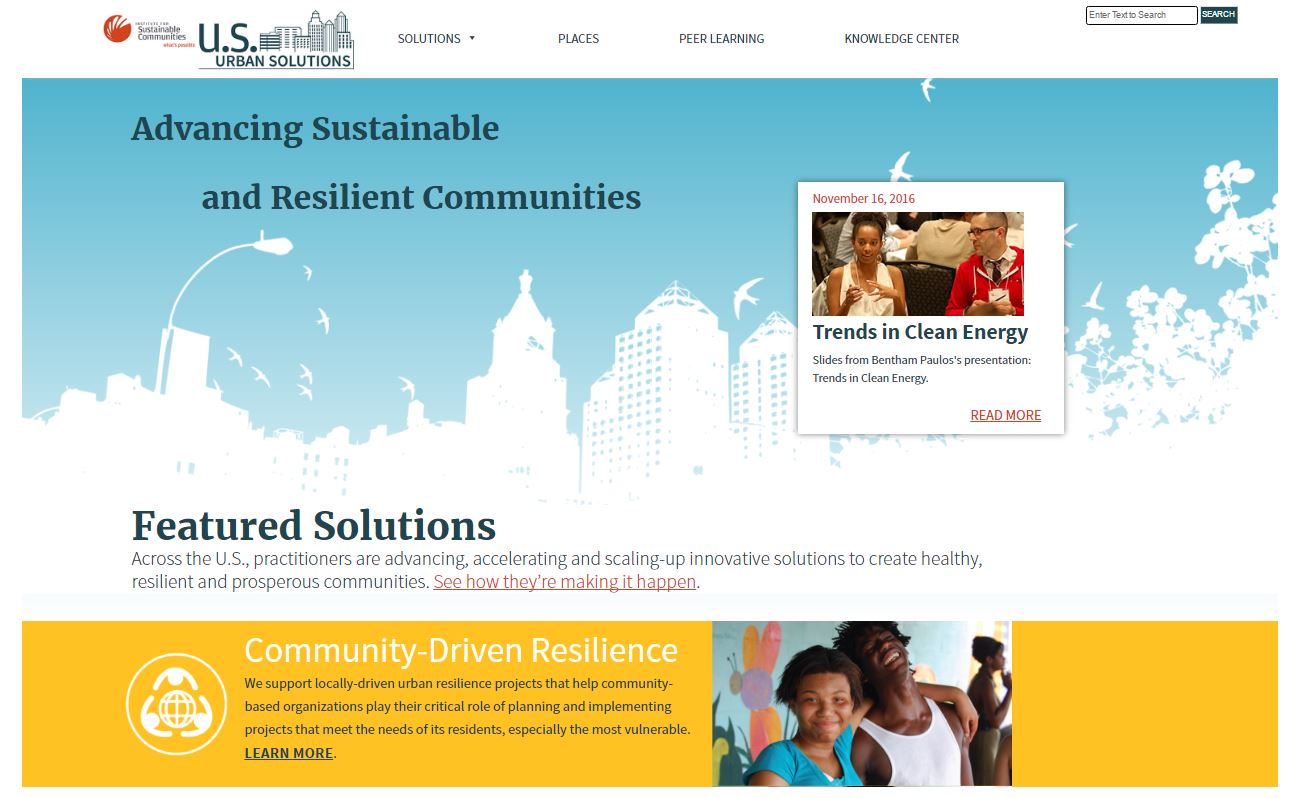
Why does the
Institute for Sustainable Communities remain focused, dogged and optimistic amid the sound and the fury unfurling on the national stage?
Because we believe deeply that the
work we do – bringing local leaders together across institutions, sectors, disciplines and viewpoints to co-create positive, collaborative, community-driven solutions – is more important than ever. We’re helping make life better in the communities we serve, offering an antidote to national discord and negativity.
And so we’re gearing up for a busy and impactful year!
Exhibit #1: our new Urban Solutions website, which is launching this week. We are especially excited about this site for two reasons. First, our U.S. program work is all about helping cities and urban regions advance and accelerate energy, climate and sustainability solutions, and we believe this new site complements our technical assistance and peer learning services, by providing a user-friendly platform loaded with high-caliber information and
ready-to-use resources. Second, our goal is always to accentuate the positive by shining a light on the collaborative, local solutions that happen each and every day across the country. This new site will help us share those stories.
 So check out our new and refreshed website! And keep an eye out for these other highlights from ISC’s U.S. program in the coming months:
So check out our new and refreshed website! And keep an eye out for these other highlights from ISC’s U.S. program in the coming months:
- We’re excited and heartened to see a growing number of cities and regions working to accelerate their transition to 100% renewable energy. That’s why we’re developing new programming and partnerships to help them along the way. For example, our Solar Market Pathways program, now in its third year, is focused on sharing out and promoting replication of the promising practices and lessons learned from the 14 projects around the country that have been inventing new ways to make solar energy more affordable and accessible. Our replication strategy will focus on four areas in particular:
- Energy resilience: increasing the use of solar energy in ways that also make communities more resilient in the face of increasingly frequent grid outages.
- Energy equity: making solar energy more accessible and affordable to low- and moderate-income households.
- Community solar: creating shared solar programs that make renewable power possible for the more than 50% of households and businesses for which rooftop solar is not feasible or cost-effective.
- Increasing solar energy on college and university campuses: tackling the hurdles of solar deployment to drive down costs of solar energy and create a workforce for the future clean energy economy.
- Our new Partnership for Resilient Communities program, aimed at building capacity for inclusive and equitable approaches to driving urban community resilience, is proving to be a timely, crucial and sought-after program. More than 50 community-based organizations across the country applied to participate. We’re working to expand this program so that we can serve more of those organizations and projects, but for now we’re partnered with two extraordinary organizations. In Baltimore, we’re helping the Living Classrooms Foundation create three community resilience centers in low-income neighborhoods, equipped with solar panels and battery storage. This will help ensure that the health and safety of residents is not at risk when the grid fails, as it does for several weeks out of the year. And in Detroit, we’re helping the Eastside Community Network work with local champions in a low-income, frequently flooded section of the city to install dozens of rain gardens in yards and on vacant lots. Both projects, with the support from ISC and the Movement Strategy Center, are improving the quality of life in underserved communities, while providing training and employment opportunities for local residents to continue to help build a stronger community.
- In Maricopa County, AZ, we’re partnered with the Piper Charitable Trust to advance community resilience, social cohesion and civic engagement. We are working closely with the social profit sector to strengthen collaboration and increase the opportunities for organizations to share lessons learned and make meaningful connections.
- Our focus on regional climate action helps sectors and stakeholders do the challenging, yet rewarding work of coming together at the regional scale, where human, financial and political capital can be pooled to achieve bigger and better results. For example, we’re helping the four-county Southeast Florida Regional Climate Compact develop and implement an innovative regional action plan aimed both at reducing climate pollution and bolstering the region’s resilience to sea level rise and other climate-related risks.
These and our other projects do more than just keep us on our toes – they keep us grounded and optimistic. As this new year and new administration take hold, our U.S. program team – 17 talented and dedicated people working out of 10 locations across the country – renews its commitment and redoubles its efforts to help local champions come together to make their communities healthier and stronger for everybody. We’re more determined than ever to help these champions do their work and share their stories, in ways that inform and inspire others.
So, bookmark our new website and stay tuned!
 Why does the Institute for Sustainable Communities remain focused, dogged and optimistic amid the sound and the fury unfurling on the national stage?
Because we believe deeply that the work we do – bringing local leaders together across institutions, sectors, disciplines and viewpoints to co-create positive, collaborative, community-driven solutions – is more important than ever. We’re helping make life better in the communities we serve, offering an antidote to national discord and negativity.
And so we’re gearing up for a busy and impactful year! Exhibit #1: our new Urban Solutions website, which is launching this week. We are especially excited about this site for two reasons. First, our U.S. program work is all about helping cities and urban regions advance and accelerate energy, climate and sustainability solutions, and we believe this new site complements our technical assistance and peer learning services, by providing a user-friendly platform loaded with high-caliber information and ready-to-use resources. Second, our goal is always to accentuate the positive by shining a light on the collaborative, local solutions that happen each and every day across the country. This new site will help us share those stories.
Why does the Institute for Sustainable Communities remain focused, dogged and optimistic amid the sound and the fury unfurling on the national stage?
Because we believe deeply that the work we do – bringing local leaders together across institutions, sectors, disciplines and viewpoints to co-create positive, collaborative, community-driven solutions – is more important than ever. We’re helping make life better in the communities we serve, offering an antidote to national discord and negativity.
And so we’re gearing up for a busy and impactful year! Exhibit #1: our new Urban Solutions website, which is launching this week. We are especially excited about this site for two reasons. First, our U.S. program work is all about helping cities and urban regions advance and accelerate energy, climate and sustainability solutions, and we believe this new site complements our technical assistance and peer learning services, by providing a user-friendly platform loaded with high-caliber information and ready-to-use resources. Second, our goal is always to accentuate the positive by shining a light on the collaborative, local solutions that happen each and every day across the country. This new site will help us share those stories.
 So check out our new and refreshed website! And keep an eye out for these other highlights from ISC’s U.S. program in the coming months:
So check out our new and refreshed website! And keep an eye out for these other highlights from ISC’s U.S. program in the coming months: